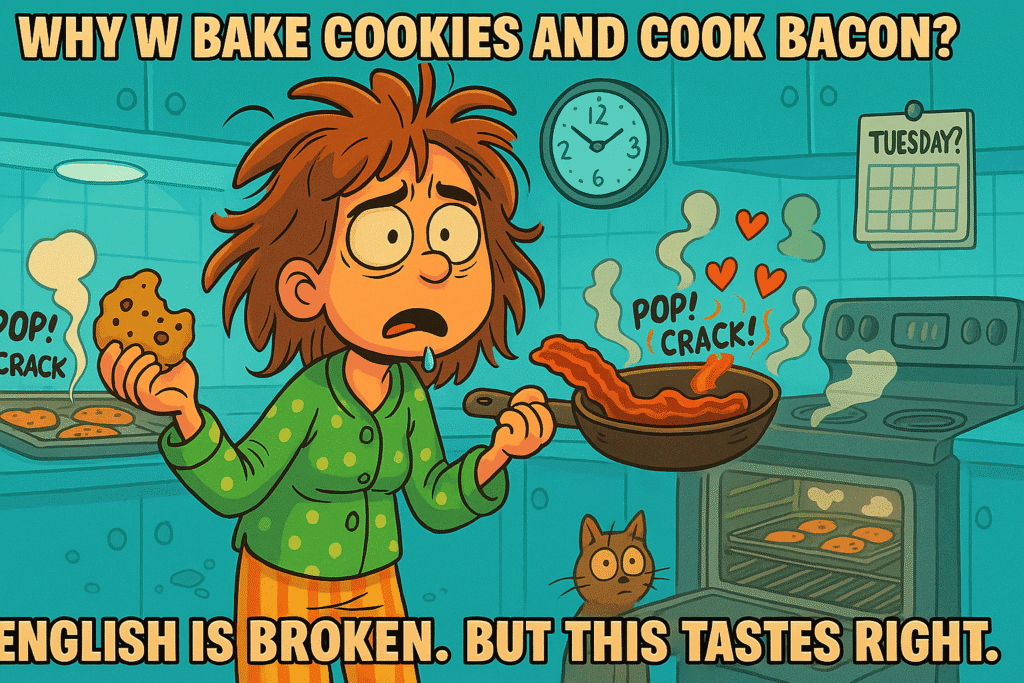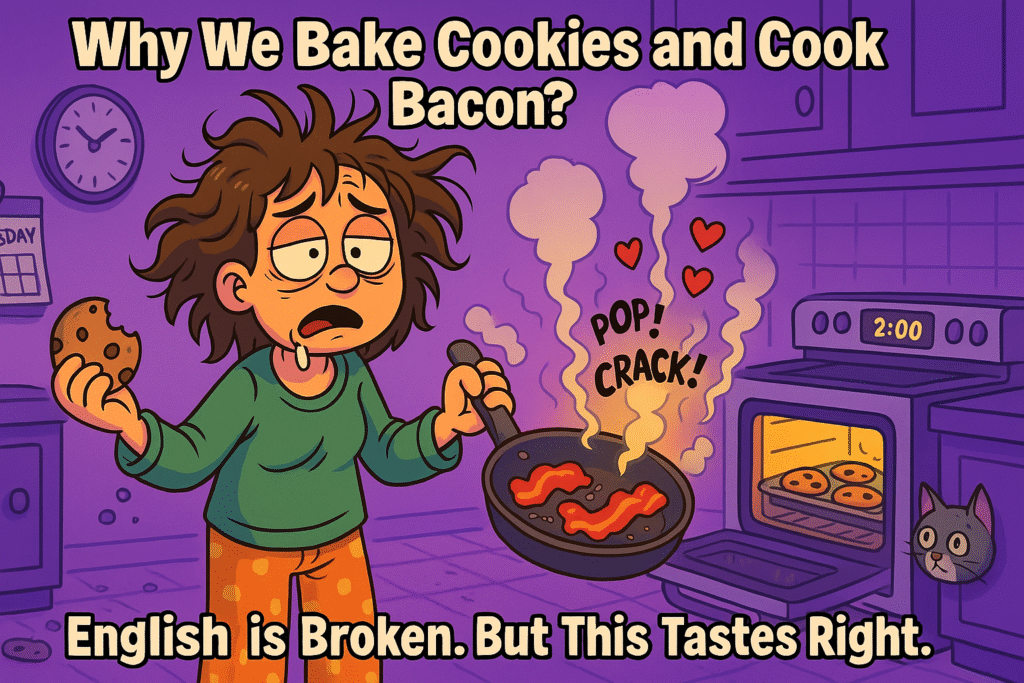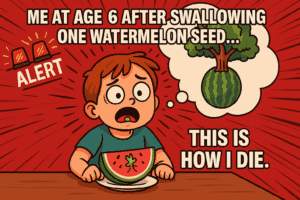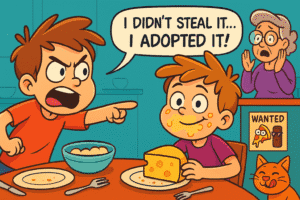We Bake Cookies And Cook Bacon

You’re in your kitchen, wearing socks that don’t match, standing in front of the fridge like a lost raccoon. One eye on the cookie jar. One eye on leftover bacon. And then—boom—your brain does that thing: “Wait a minute… why do we bake cookies and cook bacon? Shouldn’t it be the other way around?”
And now you’re not just hungry—you’re in a full-blown existential food crisis.
Welcome to the wonderfully weird world of language and late-night cravings.
Today, we’re unpacking this bizarre thought: Why we bake cookies and cook bacon?
Spoiler: it makes no sense, but that’s what makes it fun.
The Weirdest Cooking Logic Ever
Okay, let’s start with a dash of common sense (don’t worry, we won’t stay there long).
Technically, we bake cookies because baking means using dry heat, like in an oven.
And we cook bacon because it’s usually pan-fried or sizzled, meaning it’s “cooked” using direct heat.
Sounds legit, right?
But here’s the catch: if we followed that logic all the time, we’d also be saying things like:
“I’m baking pasta for dinner.”
“Let me go cook a cake.”
“I’m roasting ice cream tonight.”
See how that sounds? Confusing. Or just plain illegal.
Which is why “why we bake cookies and cook bacon” deserves a deeper dive—not just for the SEO gods, but because we all need answers.
Childhood Memory Lane: The Cookie Edition
Let’s be real: baking cookies isn’t just a method. It’s a ritual.
You remember it.
A weekend afternoon.
Your mom pulling out that big steel bowl.
You’re standing on a chair you weren’t supposed to climb, just to reach the counter.
The house smells like vanilla and magic.
You sneak chocolate chips behind her back, thinking you’re slick (you weren’t).
And when the cookies finally go in the oven, you stand there with your nose pressed to the glass, whispering, “Hurry up…”
The dough?
Probably 60% made it to the oven.
The rest? Gone. Straight into your tiny mouth.
That’s not just baking. That’s core memory stuff.
Calling it “cooking cookies” would’ve ruined the whole vibe.
“Mom, are we cooking cookies?”
Nope. That sounds like you’re boiling them in soup.
Bacon: The Loud, Sizzling Breakfast Hero
Now let’s talk about bacon.
Bacon doesn’t wait in silence like cookies.
Bacon performs.
You know it’s cooking not because someone told you—but because it announced itself.
Snap. Crackle. Sizzle.
Your whole kitchen suddenly smells like a 5-star breakfast hotel.
Even your neighbor’s cat is at your window wondering if you’re okay or just making bacon again.
Cooking bacon feels like adulting.
It requires heat management, flipping, paper towels, and a very real risk of grease burns.
(If you’ve ever been attacked by hot bacon oil, you know the trauma.)
And again—sure, you can bake bacon in the oven. People do it to avoid mess.
But the phrase “baking bacon” just sounds… wrong.
It feels like you’re putting bacon in timeout.
So yes, we cook bacon. Because bacon demands drama.
So… Why We Bake Cookies and Cook Bacon?
Because logic and language had a fight—and language won.
Here’s the deal:
“Cook” is a catch-all term. If you heat food in any way—frying, roasting, boiling, baking—it’s technically cooking.
But “bake”? That’s more specific. It’s oven-only. It’s gentle. It’s grandma-approved.
Cookies get the fancy word. Bacon gets the broad one.
It’s not about the technique anymore.
It’s about the emotion tied to the word.
“Baking cookies” sounds warm, happy, nostalgic.
“Cooking bacon” sounds bold, savory, delicious.
Try saying it the other way:
“I’m going to cook some cookies.”
Uhh… you okay?“Let’s bake bacon today!”
Please log out of Pinterest.
Real-Life Cooking Chaos
Let’s pause and talk about the real cooking experience.
If you’ve ever followed a recipe online, you know chaos lives in every step:
“Sift flour gently.” — okay but what if I don’t have a sifter? Do I karate chop it?
“Use a pinch of salt.” — whose fingers? I have big thumbs.
“Fold in the cheese.” — am I supposed to write it a thank-you note?
Even cooking bacon can go wrong.
You leave it alone for one minute—ONE—and suddenly it’s carbon.
You bake cookies for 12 minutes instead of 10? Boom. Now they’re bricks.
Kitchen instructions are like life advice from your aunt: mostly vague and slightly passive-aggressive.

The Psychology of Snack Words
Now, here’s the deeper truth.
Words change how we feel about food.
“Bake cookies” brings up soft, gooey, feel-good images.
“Cook cookies” sounds like a crime.
“Cook bacon” feels intentional, like you’re doing something powerful.
“Bake bacon” sounds like a punishment for foodies.
It’s not just what you do. It’s how you say it.
That’s why the phrase why we bake cookies and cook bacon hits so hard—it messes with our emotional food map.
Google Searches Nobody Talks About
Admit it. You’ve Googled some strange things mid-snack:
“Why does bacon spit hot oil?”
“How many cookies is too many?”
“Why we bake cookies and cook bacon” (hello, welcome to the club)
“Can I microwave cookie dough if I don’t value my life?”
These aren’t just questions. These are mini breakdowns.
Google becomes our midnight therapist, and our kitchen becomes the crime scene.
Skillet Cookies and Baked Bacon: The Great Betrayals
Ironically, yes—you can cook cookies in a pan.
Ever had a skillet cookie? It’s heaven in a circle.
Crispy edges, soft center, vanilla ice cream on top. A masterpiece.
And baked bacon? Total life hack. No mess. No splatter. Just delicious strips cooked in silence.
But would you say you’re “cooking cookies” or “baking bacon”?
Probably not.
Why?
Because language isn’t just communication—it’s culture.
And once a phrase feels right, we stick with it, even if it makes zero sense.
Also Read : How To Cook When You Are Lay And Broke
What This Says About Us
Honestly, if aliens showed up and asked “Why do you bake cookies but cook bacon?”, we’d all just shrug and offer them both.
Because food, like language, isn’t always about precision.
Sometimes it’s just about comfort. Familiarity. What sounds good. What feels right.
Eat the Cookie. Fry the Bacon.
So, back to the main question:
Why we bake cookies and cook bacon?
Because that’s what we grew up hearing.
Because it matches the energy of the food.
Because English is chaotic but charming.
Because cookies are soft and sweet and need words that feel like a lullaby.
Because bacon is bold and noisy and deserves a verb with punch.
In the end, don’t overthink it.
Eat the cookie. Fry the bacon. Question the English language later.
The next time you’re standing in your kitchen at 2AM, debating life and licking cookie crumbs off your shirt, just remember:
Some questions don’t need clear answers.
Some foods don’t follow rules.
And some late-night thoughts?
Totally valid.
So here’s to cookies, bacon, and the weird beautiful mess that is our language.
Baked Bacon & Skillet Cookies: The Unexpected Plot Twist
Okay, we’ve joked a lot. But here’s a surprise twist—yes, you can bake bacon and cook cookies.
✔️ Baked Bacon
Some people swear by it. Less mess, evenly crispy, and bonus—your kitchen doesn’t smell like a crime scene.
How to cook bacon without grease explosions:
Line a baking sheet with foil
Lay out your bacon slices
Bake at 400°F for 15–20 minutes
Use a rack if you want extra crunchiness
The result? A calm, controlled, clean bacon experience.
But let’s be honest: it still feels weird to say “I’m baking bacon tonight.”
✔️ Skillet Cookies
Now THIS is a dessert with drama. One pan. One monster cookie. No plates needed. Just grab a spoon and go full savage.
Skillet cookie easy recipe tip:
Preheat a cast-iron pan
Press in cookie dough (store-bought works too—shhh, we won’t tell)
Cook on low heat or pop it into the oven for 15 mins
Top with ice cream, crushed nuts, and your wildest dreams
It’s technically cooked, but emotionally, it’s a baked hug.
English Is a Comedy Show (And We're All In It)
If food terms confuse you, just remember: English makes everything weird.
You watch TV, but see a movie.
You cook bacon, but bake cookies.
You buckle up for safety, then say “I’m down” when agreeing.
And yet somehow, it all makes sense. We don’t question it… until we’re alone at 2AM, chewing a cold cookie and typing “why we bake cookies and cook bacon” into Google like it’s going to save our lives.
Let’s call it what it is:
The English language is your chaotic friend who shows up late, changes the rules mid-game, and still somehow wins the round.
Emotional Comfort Food Memories
Let’s go back again. Childhood.
No bills. No job interviews. Just Saturday mornings, cartoons on loop, and the smell of cookies or bacon wafting from the kitchen.
Your mom is humming. The dog is begging. You’re dancing like a gremlin on a sugar high. These foods weren’t just tasty—they were therapy.
Emotional comfort food memories stick to your brain like melted chocolate chips to a wooden spoon.
Cookies said:
“You’re safe. You’re loved. You can lick the spoon.”
Bacon said:
“Wake up. The weekend has arrived. Today, you eat like a champion.”
Why It Feels Right: Cooking Bacon, Baking Cookies
Words shape feeling. They shape rhythm. They click when they sound right.
That’s why:
“Cooking bacon” feels intentional and sizzling
“Baking cookies” feels like a warm memory
If we changed it:
“Baking bacon” sounds like a mistake
“Cooking cookies” sounds like you’re boiling dessert
When something becomes part of our culture, our childhood, our comfort zone—we keep saying it that way. Even if it doesn’t follow textbook rules.
That’s the magic of phrases like why we bake cookies and cook bacon—they’re quirky, nostalgic, and strangely comforting in their weirdness.
Google Is Our Culinary Therapist
Don’t lie. You’ve typed things like:
“Can cookies be dinner?”
“Is it safe to eat cookie dough every day?”
“Why do I hear bacon sizzle in my dreams?”
“Why we bake cookies and cook bacon?”
We don’t just want recipes—we want answers. We want to understand the emotional weight behind what we’re eating at 2AM in pajamas that used to fit better.
Because it’s never just food. It’s never just a recipe.
It’s a story. It’s a flashback. It’s a whole childhood hiding inside one bite.
Life Lessons from Bacon and Cookies
Strange how two foods can teach us so much, right?
Cookies teach you patience.
The dough needs chilling. The oven needs preheating. You wait, even if you don’t want to. But the reward? Sweet, warm, melty happiness.
Bacon teaches you alertness.
Turn your back and it’s gone. Overcooked. Burnt. Bacon is like life—it doesn’t wait. You need to stay on your toes.
So, while you’re thinking about why we bake cookies and cook bacon, you’re really learning something deeper:
About timing
About comfort
About savoring what makes you feel whole
And Now… the Final Snack Philosophy
Let’s wrap this up like a burrito made of feelings.
We bake cookies because it feels like home.
We cook bacon because it feels like waking up.
We say it that way because the words match the memory. The emotion. The vibe.
It’s not just about cooking techniques or oven temperatures.
It’s about how we experience food.
How it shapes us. How it reminds us of being 6 years old with flour on our face and no idea how to fold in cheese.
The phrase why we bake cookies and cook bacon lives at the intersection of language, memory, humor, and hunger.

Funny Things We Believed As Kids.
I once believed swallowing a watermelon seed would make me pregnant with a tree.Thank you for reading this post, don’t forget to subscribe!Let’s be real: growing up meant accepting some ridiculous “facts” without question. But we weren’t stupid—we were just pint-sized philosophers, trying to make sense of a very weird world.So buckle up for this wild, nostalgic ride through the funny things we believed as kids. Read More–>

Most Stolen Food Around The World
Let me guess—you’ve opened this blog while eating chips you promised your sibling you wouldn’t touch. Or maybe you’re silently judging someone who steals fries from your plate and calls it “sharing.” Either way, welcome! You’re exactly the kind of curious (and slightly mischievous) human who’ll love what comes next. We’re diving fork-first into the delicious chaos of the most stolen food around the world. Read More–>
